Table of Contents (Quickly Jump To Information)
Chicken predators, opossums in particular, are the bane of my existence on the homestead.
In this episode of What The Cluck?! we discuss 5 common chicken predators. Far and away, the most common predator we deal with on the homestead are opossums.
When it comes to chicken predators, you always have to be on alert, because they can spring out of nowhere, and destroy all your hard work, and take the food you’ve been raising for themselves.
While I’m sympathetic to wildlife, I also take raising my chickens seriously, so I try to do everything possible to keep them safe.
So, in this value-packed episode…
You’ll learn how to:
- Tell what predators are attacking your chicken flock based on some tell-tale signs
- Deter chicken predators
- Keep your flock safe
- Stay within the confines of the law when dealing with chicken predators
(LIKE THIS PODCAST? LISTEN TO THE REST HERE)
Links we discuss:
Getting to know chicken predators by their tracks from One Acre Homestead
American Veterinary Medical Association policies on euthanasia of wildlife
Aereal chicken predators protected by the Migratory Birds Treaty Act
How to Protect Your Chickens From Predators
Feeding Your Hens Right – My online video course about feeding chickens for so their healthy and lay better eggs.
READ NEXT:WHAT TO FEED YOUR CHICKENS FOR GREAT TASTING EGGS
Transcript
Hi there, and welcome to session 13 of What the Cluck?!, a podcast devoted to keeping chickens for fun and self-sufficiency. I’m Maat from FrugalChicken, and I’m sorry this episode is a bit late, I’ve been battling strep throat this week, and I wanted to spare you the pain of hearing my voice.
For a couple days there I couldn’t breathe or swallow, so recording this podcast was out of the question.
But I’m back, and in this episode we’ll talk about 5 common chicken predators, these are the ones I personally have the most experience with, how to identify which of these predators killed your hens based on some tell-tale signs, and what you can do to prevent them from killing your even more of your chicken flock.
This will be an information packed episode that’s full of advice you can use today. So stay with me!
Now before we get started, I just want to briefly mention a company that I love and that’s Thrive Market. Now, the reason I’m telling you about them is because it’s where I source raw, organic items I use on my homestead.
So when it comes to your chickens, having raw, organic items on hand, such as honey, becomes extremely important if a chicken, or any animal really, and I personally source all of my raw organic honey from Thrive.
If you don’t know what Thrive Market is, it’s an online organic supermarket, and it’s a little like Costco meets your favorite farmers market. Thrive Market is membership site, and their products are anywhere from 15% to 20% cheaper than I’ve found elsewhere.
I value my Thrive Market membership, and love that it’s a green company committed to sustainable practices, so their products are ethically sourced, and I feel confident buying from them that I’m doing the best I can for our environment.
Another thing I love about Thrive Market is that for every membership they sell to someone like you or me, they give a membership to a family in need. So, it really is shopping for products you will use anyway in a way that benefits other people too.
You can join Thrive Market at thefrugalchicken.com/thrive, and that is an affiliate link, so thank you if you decide to use it.
Now, let’s get on to why we’re here. And just as a reminder, you can access this podcast’s show notes at TheFrugalChicken.com/podcast13, that’s Podcast one three all one word.
Today we’ll talk about common chicken predators, and I know on our farm we’ve seen an uptick in the amount of predators since winter started and other food became scarce for predators.
Far and away the biggest chicken predators on our farm are possums, and just the other night we were woken up at midnight as a possum went after some of our chickens. What happened was during the struggle, the possum began banging on a brooder that’s against the house.
I didn’t put our young roosters away in their coop because I was really sick with strep, and stupidly figured nothing would happen for the night because the chickens were all roosting up off the ground.
Don’t make the mistake I did, we lost a nice 4 month old buff orpington rooster to this possum. These are meat birds that we’re pasture raising organically, so they’re not kept in a run consistently like our laying hens, but instead allowed to roam a 3 acre pasture and then cooped at night.
Now, one thing I must mention before we proceed. It’s often advised online and in Facebook groups to kill chicken predators, and I firmly believe if a predator is coming after your flock and trying to take what’s yours, you have a right to defend your flock.
That being said, you should know federal and state laws about killing wildlife. For example killing hawks and eagles is prohibited, so I can’t shoot a hawk that steals my chickens. I have to simply better proof my coop from aerial chicken predators.
Just today, I heard a story about a man who was sent to federal prison for three years after accidentally poisoning a bald eagle. He had left the poison out for coyotes and a bald eagle got it. The Department of Natural Resources was able to trace the poison back to that chicken owner.
So, I really don’t suggest hunting any hawks or eagles that attack your chickens.
READ NEXT: 10 ABNORMAL CHICKEN EGGS & WHAT YOU NEED TO KNOW!
Similarly, in some areas is illegal to relocate wildlife, and also you might run into trouble if you shoot them, especially a domestic dog.
In my area, I’m pretty sure there wouldn’t be any legal consequences if a dog that attacked a chicken flock was shot, but in other areas of the country, especially more urban areas, you might be looking at gun and animal abuse charges.
In fact, in the Mid-Atlantic, I know of cases where owners have shot domestic animals and did indeed face criminal gun charges. And be aware that if you shoot someone’s pet, you might face civil suits as well.
This is just my PSA based on experience. So know your local laws and have a plan to deal with chicken predators within the confines of these laws so you stay out of trouble.
Your best bet is to consult with your state’s department of wildlife or conservation, and in the case of domestic dogs, consult an attorney familiar with animal law in your state.
Now a word about relocation. Some chicken owners prefer to trap and release wildlife that’s been attacking their chickens. You should check with your local department of conservation about your state’s laws regarding relocating chicken predators.
In my area, it’s not recommended to relocate wildlife because our local department of conservation is concerned about spreading diseases, creating problems for other chicken owners, and upsetting the established wildlife population.
They recommend euthanizing chicken predators by gunshot or what they recognize as another humane method of euthanization in accordance with the American Veterinary Medical Association’s recommendations.
So, my advice is to check with your state about their recommendations regarding relocating chicken predators.
So there’s a lot of chicken predators out there, and the ones you need to worry about depend on where you live. I have friends that lose their flocks to bears, but we don’t have bears in our area.
How you deal with predators, again, will depend where you live and which chicken predators you’re dealing with.
But in this podcast, we’ll go over some of the more common chicken predators, and these are ones that I have experience with.
- Domestic Dogs
So first on our list of chicken predators are domestic dogs. And they might not be your dogs, but perhaps a neighbor’s, or family member’s.
Or, might just be your dog, as was our situation. My dog was an indoor dog that I’d had for years, and he was gentle with people and my cats.
I never would have thought my dog would have ever killed a chicken, but one day, his hunting instincts set in, and he killed half our flock.
We tried tying him up when he was outside, which generally worked, but if he got loose, he would go into the coop and to kill every one. Similarly if a chicken got too close to him, it was toast.
It’s just one of those things that happens to chicken owners from time to time, and I don’t think it’s breed specific. There are certainly breeds like livestock guardian dogs, that are more protective of a flock of chickens.
But I’ve also seen lap dogs, like Pomeranians, kill chicks, so while certainly some breeds are more predisposed to hunting instincts, I think it just depends on the individual dog.
So if your chicken flock is attacked, here’s how can be reasonably assured it was a dog that killed them. Dogs like to bite chickens in the middle and aggressively shake them until they’ve done enough internal damage that the chicken dies.
They rarely eat the chicken, and I think a lot of the killing is done for sport, especially if the dog is well fed. Unlike some other predators, dogs might kill your entire flock because to them, it’s a game and they’re having a good time.
To prevent these attacks make sure you have solid fencing around your coop and your dog can’t get into it. If digging underground to get into the coop becomes an issue, then letting your chicken wire go 4 inches below the surface of the soil will deter the digging.
You can also place chicken wire under the ground but parallel to the ground, so digging is even further deterred. I also advise covering your run if you think dog might jump into it.
READ NEXT: YOU CAN RAISE MEAT CHICKENS (AND GO THROUGH WITH IT!)
- Hawks
Next on our list of chicken predators are hawks. Now, there are about 270 species of hawks, and the ones pecking off your flock will depend on the species specific to your area.
All species of hawks have some basic similarities like very good eyesight which is said to be the best in the animal world, talons on their feet and sharp, hooked beaks for capturing and eating prey.
Hawks have extremely good eyesight and like to perch high to scan for prey. I’ve seen hawks on our property perching in trees close to our chickens, trying to choose which they’ll try to run off with.
Once these chicken predators spot their prey, the hawk will swoop down and pin the bird down with its talons, often killing it on impact. If the chicken is too large to swallow whole, if it’s larger than a chick, for example, the hawk will tear it into bite-sized pieces with its beak.
The easiest way to protect your flock from chicken predators like hawks is by constructing a secure coop with a covered run. Using metal such as tin or wood for the coop and run cover, hardware cloth or chicken wire are good options.
For the chicken coops we built, we used tin for the roof, and chicken wire to cover the runout area. Make sure the cover is secure, without any loose or weak parts through which a hawk could gain access. In particular, with chicken wire, make sure a hawk can’t just crash through it because it’s not secured well to the sides of the run.
If you let your chickens free range, you can also give them places to hide like bushes, although this is not nearly as effective as a covered run. A well-trained dog might also deter a hawk, while roosters and guinea fowl especially can alert a flock to a chicken predator.
Now, remember that hawks are protected by the Migratory Birds Treaty Act, and capturing and killing them might get you into trouble. Your best bet if a hawk attacks your flock is to create a covered run instead of trying to capture it or kill it.
So, how do you know if a hawk took your chickens? Hawks don’t generally leave many tell-tale signs, and obviously no footprints, but I’ve observed feathers, so if you see a lot of feathers or other signs of a struggle in one spot and no chicken, then it’s a good chance a hawk took your chicken.
- Opossums
Next on our list of chicken predators, we’ll talk about opossums, and this is the biggest predator we have to contend with on our homestead right now. Opossums are marsupials that are found in the Eastern, central and west coast states of North America and some parts of Canada.
They’re nocturnal chicken predators, and while we sometimes see them in the day, they generally hunt at night, when people are asleep, and like to hide in trees and any small spaces. They’re efficient killers and once attacked, the chickens don’t typically live.
That being said, I had one young rooster recently that lived through an opossum attack, with a very deep wound on his back that’s still healing.
So opossums use their claws to kill chickens, ripping them open and pretty much apart. I’ve walked into coops after a possum attack and there’s just pieces of chickens everywhere, it’s pretty disgusting.
They don’t usually eat the whole chicken, but only part, and many times it’s the head. They will kill more than one chicken, but opossums usually only kill for the food they need that day.
To prevent opossums from killing your chickens, it’s best to have a secure coop with no entry points. I’ve had possums get into my coop under a door that had an extra wide gap, so they can get through narrow spaces.
Using 1” to ½” hardware cloth is best, and I like to staple the hardware cloth to wood on the top and bottom of the coop and run so the opossums can’t fit underneath.
- Coyotes
Coyotes are third on our list of chicken predators, and if you don’t know what that is, a coyote is a species of canine that hunts in packs.
They’re slightly larger than foxes. Most adults weigh between 22 to 25 pounds on average.
These chicken predators particularly like to go after chickens because they’re easy prey. Coyotes typically hunt at night but I’ve seen them and lost chickens to them during the day, so I think if they see an opportunity to get an easy meal, they will.
You know a coyote is around because you’ll hear when they have prey, they start to wolf pack it as they fight over it. Their barks are rapid and high pitched and you usually hear a lot of them at once. It sounds similar to a dog bark, but it’s still pretty unique.
To illustrate the kind of damage a pack of coyotes can do, I’ve seen photos of calves, probably between 2-3 weeks old, that have been completely skeletonized by a pack of coyotes overnight after it became their chosen prey. It’s pretty ugly.
Coyotes kill by going for the jugular with their teeth, and if possible, they take their prey away from the scene of the kill to eat.
And if these chicken predators have attacked your flock once, they will do it again. Keeping chicken coops securely locked at night, and making sure there are no cracks or easy ways for coyotes to get in will deter these predators.
You’ll know a coyote has killed your chickens if you hear their barks and/or see signs of struggle, as well as coyote tracks. Unlike opossums, coyotes will take their prey away from where they killed it, so if you see a dead or disemboweled chicken, it’s not as likely to be a coyote.
You should check with your local wildlife authority about whether you’re allowed to kill coyotes before shooting one, to be on the safe side, but you can always let a few rounds off which might scare them away.
Another option are predator deterrents that contain a motion sensor that flashes lights if they’re set off.
- Raccoons
Fifth on our list of chicken predators are raccoon, and we all know what they look like. I don’t really see many raccoon in our area, but they do pop up every so often.
Raccoon are nocturnal, and the tell-tale signs of a raccoon killing a chicken is similar to opossums, but there are a couple key differences.
Like opossums, raccoon attack chickens by biting their heads or upper neck area to kill them. Raccoon like to rip or bite the head off of a chicken, leaving the head a distance away from the body and eat the breast and crop as well as the guts, leaving the rest behind.
These chicken predators kill for food, but unlike opossums, they’ll also kill for sport, going after several chickens in one night and leaving the bodies in the coop or run. I’ve also seen raccoon rip chickens right through chicken wire, pretty much mutilating them to death.
While opossums will eat chickens where they’ve killed them, raccoon will sometimes eat them there, but they’ll also strew the bodies yards away from the kill site, so if you come across a number of dead chickens, and they’re all over the place, it’s more likely a raccoon than a opossum.
Of course, if you see raccoon tracks, which are bigger than opossum tracks, you’ll know your culprit that way too.
Raccoon are extremely smart and can figure out how to open simple latches, so if raccoon are an issue in your area, then using several latches or a single complicated one is a good deterrent.
Raccoon are attracted by things like chicken feed laying around, as well as garbage or anything that can be an easy meal for them.
Keeping the area clean of trash and removing chicken feed at night is another way to deter these chicken predators. Raccoon have nimble fingers that can easily fit through chicken wire, so using a ¼” or ½” hardware cloth might be your best bet if raccoon are a problem in your area.
A lot of states have regulations surrounding shooting and relocating raccoon, so talk to your local wildlife authority before taking either of those actions.
Now, for more information about animal tracks, my friend Janet at One Acre Farm is a wildlife tracking expert.
Her website is OurOneAcreFarm.com and in the show notes, I’ll put a link to her blog as well as an article that goes deeper into track identification of chicken predators.
There, you’ll find all sorts of information to help you figure out which chicken predators around your coop. You can access this podcasts show notes at TheFrugalChicken.com/Podcast13, that’s podcast one three all one word.
So, are there chicken predators in your area that you regularly contend with? I’d love to hear about it, so there’s something I want you to do. I would love it if you dropped me a line at editor@thefrugalchicken.com to let me know how you handle chicken predators or if you have any questions about it.
Now, this is just a gentle reminder that my course Feeding Your Hens Right comes out in January.
If you keep chickens for their eggs, and want to learn about how to best feed them so lay the most nourishing eggs possible, then you’ll want to check out my new course, Feeding Your Hens Right, which you can see at feedingyourhensright.com.
In this course, you’ll learn how to feed your chickens so they get an optimal diet, lead healthy happy lives, and lay the most nourishing eggs possible.
As we grow increasingly sophisticated in understanding where our food comes from and the repercussions of eating poor quality food, it’s important to understand how your hens diet effects the quality of her eggs.
Anyone who has a wheat allergy and can’t eat store bought eggs will understand what I mean.
A friend recently told me that if she feeds her chickens a wheat based diet, her son, who is wheat intolerant, will get sick. So, that right there is proof that your hen’s diet does effect the quality of her eggs, and studies have shown the exact same thing.
I’m not making this up, researchers have proven it in several studies.
If feeding your family the most nutritious food possible is important to you, then you’ll want to check out my course.
It’s 5 video workshops, that you can access at any time. There’s specific recipes for homemade feed that can be tailored to your particular needs, and you’ll learn how to raise a happy, healthy flock of chickens.
The URL for that course is FeedingYourHensRight.Com, all one word.
READ NEXT: ORGANIC CHICKEN FEED RECIPE (THAT WON’T BREAK THE BANK)
Thanks for listening to this episode of what the cluck about common chicken predators, and I’ll see you next time!
Maat van Uitert is a backyard chicken and sustainable living expert. She is also the author of Chickens: Naturally Raising A Sustainable Flock, which was a best seller in it’s Amazon category. Maat has been featured on NBC, CBS, AOL Finance, Community Chickens, the Huffington Post, Chickens magazine, Backyard Poultry, and Countryside Magazine. She lives on her farm in Southeast Missouri with her husband, two children, and about a million chickens and ducks. You can follow Maat on Facebook here and Instagram here.


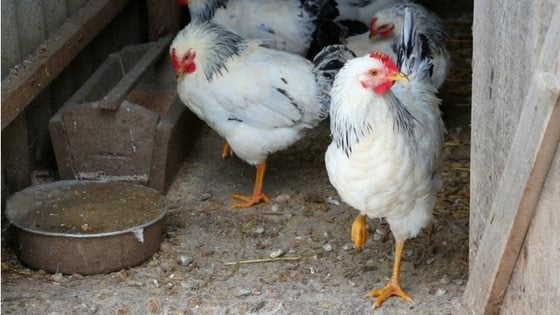
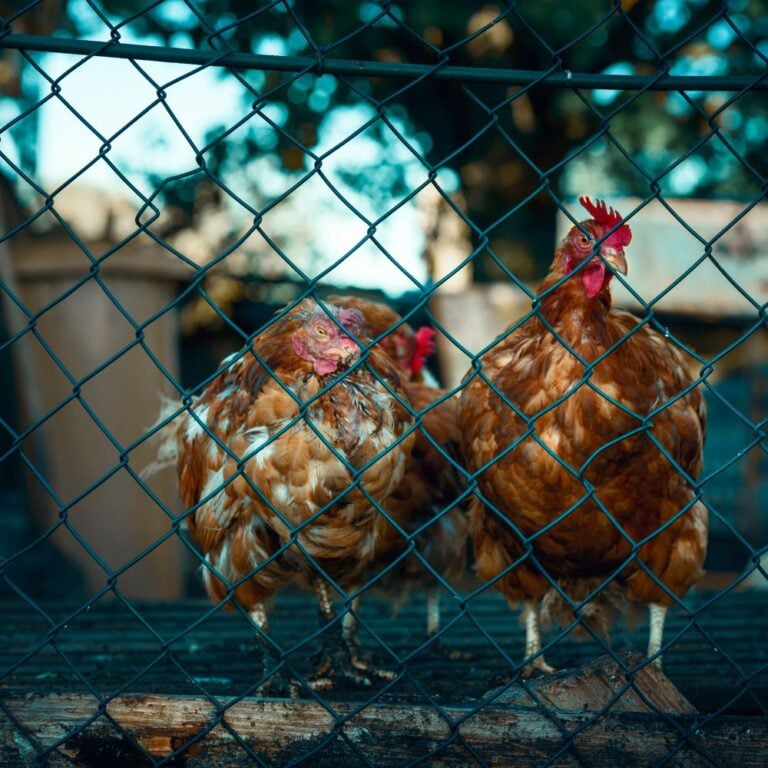
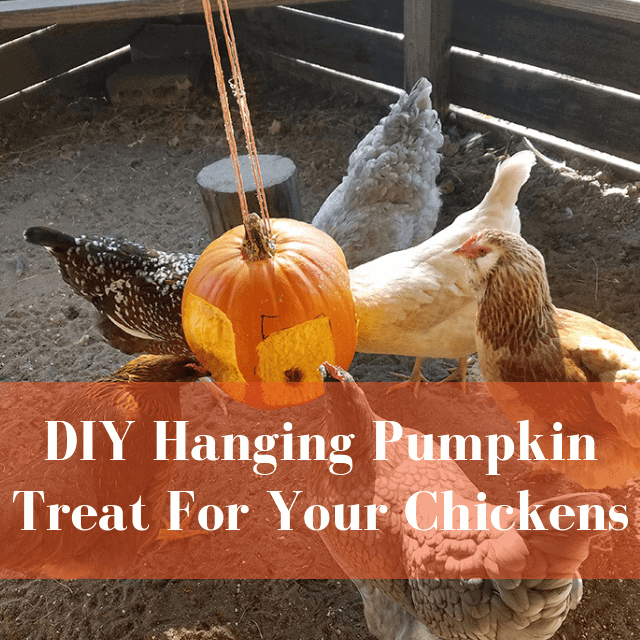
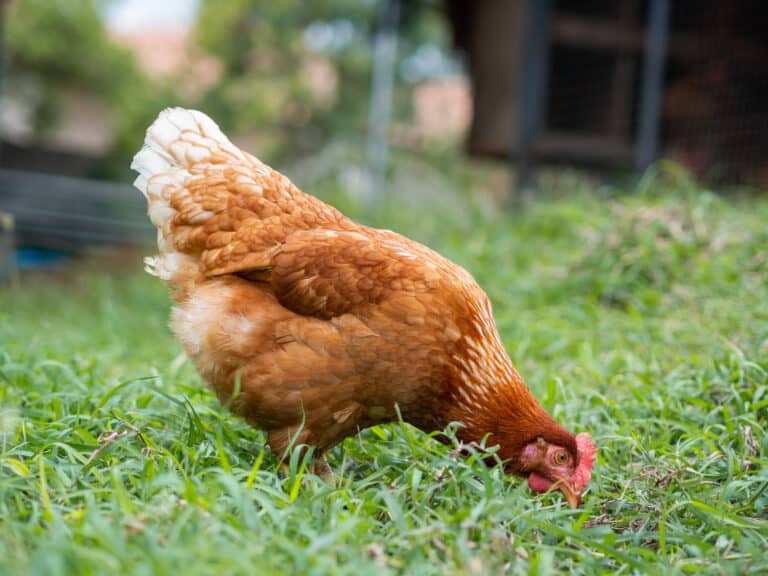

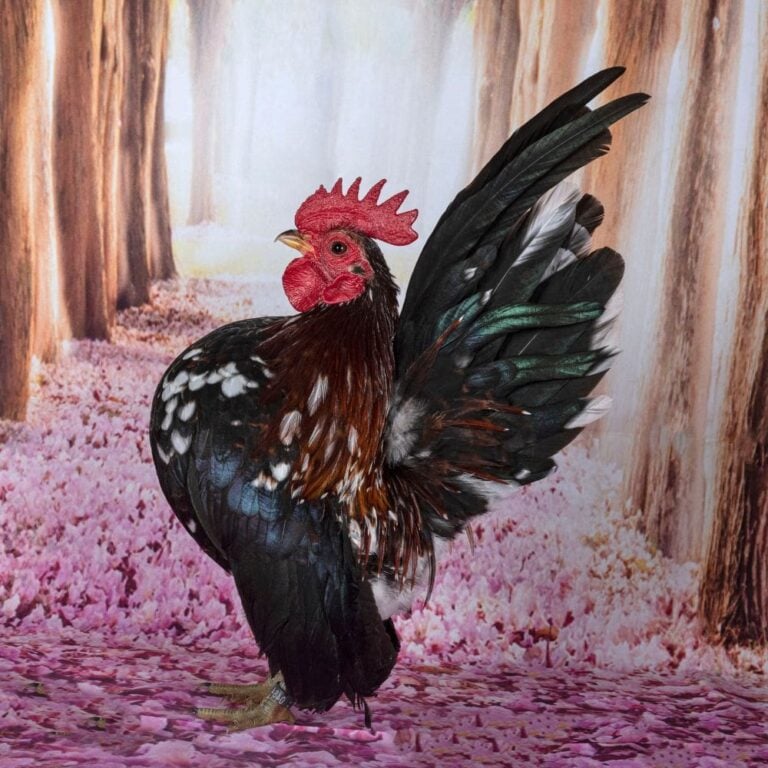
What about skunks? I’ve heard they just eat the heads.
Hi, yup, skunks are similar to opossums. Luckily, their tracks look a little different. Sometimes they go for the head, they also like to eat the bellies and leave everything else.
My culprit might be skunks then. They picked them off 1 by 1 last year. We couldn’t find out how they were getting in though. It was large bite marks on the back of the necks. No flesh removed though. It was like an animal vampire. Have you heard of this before?
Also, I found you through the Beyond off Grid & I am wondering if the link still applies?
Thank you for doing that podcast!
Hi, it might be skunks, the bites sound like skunks or possums, but not eating them is not usual. Is it possible they were raccoon? Another option are minks and weasels, although it depends on your location. Weasel might be a strong possibility, they can get through tiny cracks. Regarding the Beyond Off Grid summit, if you’re referring to my course, yes, the link still applies for the next couple days. You can grab it at http://FeedingYourHensRight.com. Thanks for your interest! It’s almost ready to launch (and a lot of the materials are up there already, just a few more videos I need to complete.)
Minks will leave,”vampire marks”,on the neck,drinking the blood and leaving the body intact. Evidenced by pale crop. Look for tunneling below ground if they entered your coop w/o fence damage.
Is it true that chickens will kill their fellow flock members if they are sick?
Hi folks. What killed my Alpha Rooster? I went out to feed my free range flock today (2 roosters, 7 hens), but the Alpha Rooster was missing. I looked around the yard and finally found him dead inside an open storage shed. No part of his body was eaten, but feathers were scattered in the immediate area around his body, and he appeared to have a bloody wound in the center of his back. Last year, I lost my favorite hen the same way – she had a deep bloody wound in the center of her back but no part of her was eaten.
I thought about just writing the first paragraph so as to not color your opinions, but decided to offer some other possible clues (although neither may be related).
First, I also lost two four-year old ducks this winter. Both were very large, especially the drake. Something killed the female first, left her in tact, and then came back the next night to eat her from stomach to spine (head left in tact). A few days later, the giant drake was killed, left in tact, and again the predator came back and ate him from stomach to spine the following night. I set a trap in the duck pen after the drake was killed and caught a skunk. With this in mind, could a skunk kill large ducks and/or my Alpha Rooster?
Finally, we do have a 10-year old dachshund who we let outside to relieve himself. My neighbor tells me that on the night of my favorite hen’s death last year, the dachshund chased my hen causing her to fly up into a tree. Yesterday, I also had to reprimand the dog as he began to give chase to one of the hens. It’s a possibility, then, that when he was let out this morning, he may have tried to chase the hens and he bit the Alpha rooster on the back while the rooster was defending the flock. I should point out though that I’ve had a flock of chickens as long as I’ve had the dog, so I would expect to have lost many more chickens with bites to the back over 10 years. The dog also had no access to the duck pen, so there is no way he could be responsible for the duck deaths or eating them.
Finally, I live in southern New Jersey, so suspected predators that have killed my chickens in the past include: (1) Cooper’s Hawks; (2) Owls; (3) raccoon; and (4) opossum. Skunks, feral cats, and domestic dogs are other possibilities.
Thanks in advance for your opinions.
Hi Dave, to answer your questions, yes, a skunk can kill your chickens, but usually they rip them up and eat them. Based on what you’re describing, it sounds like a domesticated dog is killing them. Dogs usually kill for sport by gripping the chicken in the middle, then shaking the bird until it’s mortally wounded. It’s a game. Predators other than domestic dogs usually eat at least part of the chickens in my experience. I can’t say 100% that it’s a dog, obviously, but that would be my first guess.
Hello there, I just wanted to give a thank you for the post. I posted it on my Facebook page and got an excellent response. Keep up the good work.